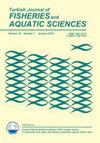Can Dietary Hazelnut Oil Inclusion Alleviate the Negative Effects of Oxidized Fish Oil in Rainbow Trout (Oncorhynchus mykiss) Juveniles?
IF 1.7
4区 农林科学
Q3 FISHERIES
引用次数: 1
Abstract
Rainbow trout juveniles were fed different levels of fresh fish oil, oxidized fish oil and fresh hazelnut oil for 9 weeks. Growth performance and feed efficiency was significantly influenced by oxidized fish oil (P<0.05), but not by hazelnut oil supplementation and their interaction. Fish fed diets containing fresh fish oil had better growth and feed efficiency than those fed diets containing oxidized fish oil. Digestibility decreased with the increase in both dietary oxidized fish oil and hazelnut oil. Fatty acid profile in whole body lipids was significantly influenced by the experimental diets (P<0.05). Polyunsaturated fatty acids (PUFA) showed significant decrease with both dietary hazelnut oil inclusion and dietary oxidized fish oil. Dietary hazelnut oil resulted in a significant increase in hepatic vitamin E and a significant decrease in lipid peroxidation level (P<0.05). Our overall results suggested that dietary oxidized lipids caused growth depletion, lowered nutrient digestibility, lipid peroxidation, and decreased eicosapentaenoic acid (EPA; 20:5n-3) and docosahexaenoic (DHA; 22:6n-3) levels in rainbow trout. However, dietary hazelnut oil inclusion alleviated the negative effects of oxidized oil, sparing n-3 long-chain PUFAs such as EPA and DHA, and increasing hepatic α-tocopherol level which lowered lipid peroxidation despite no significant impact on growth.食用榛子油能减轻氧化鱼油对虹鳟(Oncorhynchus mykiss)幼鱼的负面影响吗?
分别饲喂不同水平的新鲜鱼油、氧化鱼油和新鲜榛子油9周。氧化鱼油对生长性能和饲料效率影响显著(P<0.05),榛子油及其互作对生长性能和饲料效率影响不显著(P<0.05)。饲料中添加新鲜鱼油的鱼比饲料中添加氧化鱼油的鱼有更好的生长和饲料效率。消化率随氧化鱼油和榛子油添加量的增加而降低。饲粮对全脂脂肪酸分布有显著影响(P<0.05)。多不饱和脂肪酸(PUFA)在添加榛子油和氧化鱼油后均显著降低。饲粮添加榛子油显著提高了肝脏维生素E水平,显著降低了脂质过氧化水平(P<0.05)。我们的总体结果表明,膳食氧化脂质导致生长枯竭、营养物质消化率降低、脂质过氧化和二十碳五烯酸(EPA;20:5n-3)和二十二碳六烯(DHA;[22:6]虹鳟鱼体内的氮含量。然而,饲粮中添加榛子油可以缓解氧化油的负面影响,保留n-3长链PUFAs(如EPA和DHA),提高肝脏α-生育酚水平,降低脂质过氧化,但对生长没有显著影响。
本文章由计算机程序翻译,如有差异,请以英文原文为准。
求助全文
约1分钟内获得全文
求助全文
来源期刊

Turkish Journal of Fisheries and Aquatic Sciences
FISHERIES-MARINE & FRESHWATER BIOLOGY
CiteScore
3.10
自引率
0.00%
发文量
43
审稿时长
3 months
期刊介绍:
Turkish Journal of Fisheries and Aquatic Sciences" (TrJFAS) is a refereed academic journal has been published by Central Fisheries Research Institute of Turkey and Japan International Cooperation Agency (JICA), and published in English.
It aims to address research and needs of all working and studying within the many varied areas of fisheries and aquatic sciences.
The Journal publishes English language original research papers, critical review articles, short communications and technical notes on applied or scientific research relevant to freshwater, brackish and marine environments.
TrJFAS was published biannually (April & November) between 2001 and 2009. A great number of manuscripts have been submitted to the journal for review from acceptance of the SCI index. Thereby, the journal has been published quarterly (March, June, September and December) from 2010 to 2017. The journal will be published monthly in 2018.
 求助内容:
求助内容: 应助结果提醒方式:
应助结果提醒方式:


